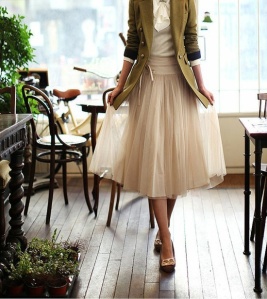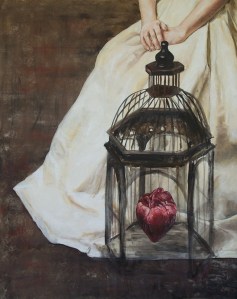
[this is part of a series. Here are parts one, two, three, and four]
[trigger warning for victim blaming and rape]
During all of my plodding toward a real understanding of myself, I went about life. I taught college writing, I flew down to Florida for a wedding– I even went on a couple of dates. Life was a strange split between normalcy and panic.
Part of what kept me together during all of this were the brief moments when I could let things go. There were times I could slip into a frame of mind where I could drop my burden and escape. Sometimes, these were the weekends when I could sit in a rocking chair on my front porch, look at the mountains, and watch hummingbirds flit around the azalea bushes. They were the times I fell asleep in a hammock with a good book in my hands.
One of these times was when I drove up to the Chesapeake Bay area to visit a good friend, who announced when I arrived that there was someone I should meet. The hell with it, I thought. Sure, why not? She took me over to her boyfriend’s place, where we were celebrating another friend’s triumphant trek up the Pacific Trail from Mexico to Canada. While Matt* demonstrated making camp food for us, he walked in.
Tall, red-headed, the swimmer’s physique. And he made quips. Snarky ones. He made me laugh a good dozen times in the first ten minutes. I liked him, almost instantly.
The best thing that happened that night was that it turned into one of those “times.” When I could just . . . let go. I seal-clapped. I threw my head back when I laughed. I jumped up and down when someone suggested we watched Independence Day. I made Star Wars jokes. I burst out with “The Hero of Canton” when Adam Baldwin showed up in Area 51. I speechified about linguistic nuances. I enthused over swing dancing.
About a week later, Handsome called me. He wanted to write me letters. The first one came with roses. Our first date was in D.C., for the cherry blossom festival. We went to the Air and Space Museum, where I lay down on the floor to look at the Saturn V rocket, just to get a better perspective, and he got down on the floor with me.
That was the moment when I fell in love.
~~~~~~~~~~~~~~~~~~~~
But, I was still suffering from panic attacks. The depression was easing, but I was still going through so much– and I didn’t want to saddle him with that. I wanted to exorcise my demons. Coincidentally, I received a recommendation for a biblical counselor who specialized in sexual abuse, and I made an appointment to go and see her.
The following is . . . difficult, for me. Because the title of this series is not “why you should never seek biblical counseling.” It’s “the dangers of biblical counseling.” My intention is not to dismiss biblical counseling as an approach– that would be throwing the baby out with the bathwater. Biblical counseling can be helpful, healthy, and productive.
It helped me.
And . . . it didn’t.
The woman I went to see was gentle and kind, tender and compassionate. The first time I went to see her, I had a panic attack in her office. I was as nervous as hell the entire time. She probed me, so very carefully, and asked to hear my story. I told it to her, in broken snatches. She asked me what had finally brought me to the point that I wanted help, and I told her about Handsome. I told her about how I wanted to avoid burdening him with my baggage. I told her about the guilt I carried. For the firs time, I told all of the truth to someone. I laid myself bare.
Here is where we run into problems, although I didn’t really see it this way at the time. I want you to understand that the woman I was speaking with was so very obviously loving. She had dedicated her life to helping women like me, because she had been through it. She sympathized– I hadn’t met anyone this empathetic in a long time. She was grounded, and real. She encouraged me to open up the dark silences in my head– to confront what had kept me trapped and confused. She told me that I couldn’t afford to stunt and ignore my emotions, but that I should allow them to enrich my life instead of stifling them in the name of “temperance.”
But.
But.
She also told me two things: the first was that my attempt to take part of the blame for what had happened to me was healthy and correct. That I was right to look for ways I might have been responsible. Everything she said were things I had heard before– that it was good that I was recognizing where I hadn’t been a victim, that I was choosing to shoulder my choices. This was good– it meant I could stop it from happening again, if I took the opportunity to learn from it.
This is also known as victim-blaming. Oh, it sounds completely sensible. When you’re listening to this, nothing stands out as wrong– it all just seems like practical advice. Who wouldn’t want to protect herself from further damage and harm? To stop it from happening, ever again, if it could be prevented? Especially when it’s something as straightforward as “learning from past mistakes.” But, its very sensibility is the problem. It makes sense because we live in a culture that endorses and encourages rape any time we tell someone that any part of what happened to her or him was partly their fault– that he or she could have done something to prevent it. These solutions are based on a series of false assumptions– most of which have nothing to do with the circumstances that led to my rape. But they are an integral part of our discussion about rape, and it came up here.
The second thing that she told me . . . it was a bucket of ice-cold water in my face. I was a “poisonous well,” and starting a relationship with Handsome would be to his detriment. If we were in a relationship, and I was still “ensnared by my past,” I would “pull him away” from following God, that I would damage our new relationship to the point where we couldn’t recover from it.
I cried myself to sleep that night.
These were familiar phrases, familiar ideas– most especially the poisonous well. For me, and for many people, this idea is linked to Proverbs 4:23, where the heart is the “well spring of life.” When we let impurity into our “wells,” we are essentially poisoning ourselves, and we’re at risk for poisoning others. “Put another way, an unguarded heart can lead to a poisoned spiritual wellspring, one that is tainted with bitterness or self-loathing.” If I was a poisoned well, it meant that I was bitter and unforgiving, that I was holding onto anger– and this would corrupt Handsome, and our relationship. Those with poisoned wells are “toxic” to the people around them, spiritually and emotionally.
In essence, this type of rhetoric is just another form of victim-blaming, although it focuses on after-the-fact elements. Not only was my rape partly my fault, but the after-effects of being raped were also my fault. I had to keep on acknowledging one to get rid of the other. I had to be open and repentant about my sin in order to fully recover.
I continued to see her for another few months, until the end of the school year and life got busy and complicated. I never felt comfortable talking about my blooming relationship with Handsome, because I was deeply terrified of being told I was a “poisonous well” again. And there is another danger of biblical counseling. When you seek biblical counseling, you are automatically creating a hierarchy, a power dynamic. Because you’re seeking biblical counseling. You are outright acknowledging that this person is superior to you spiritually, and that they have the authority to tell you how to fix yourself.
Granted, this power dynamic is not always at play in biblical counseling– and it can certainly be present in secular counseling and therapy, too. This is not a “Christian” problem, entirely– it’s a human one. We create power dynamics and hierarchies everywhere we go. But I think that this is an area that shows up in a unique way in biblical counseling, because looking to “higher spiritual authorities” is as natural to us as breathing. And I, so naturally I did not even notice, placed this earnest, God-loving, sacrificial woman as enough of my authority to make me feel guilty for falling in love.
I will be honest– there were many things I learned through this process that were helpful. She gave me tools to help me recover, and the panic attacks rarely ever happen anymore, and the depression I suffered for three years is mostly gone. She encouraged me in many ways, and I’m thankful for that.
There should always be a “but,” however. I’m not throwing the entire thing under the bus– it is just my honest desire to bring these elements to the light. I’m not the first one, and I can only tell my story– I can’t speak to any other experience but my own. But, for me, and many of my loved ones, biblical counseling has been a harrowing process that caused untold damage to their lives and relationships.
So, it is an area that should be approached with caution. Look for someone who has a degree, and is licensed and certified. Research where they got their certification– all the major certification bodies have enough information on their website to get a general feeling. Find out what they think about biological and neurochemical processes and medication. You have the right to interview a prospective counselor– ask them about their views on marriage, what their goals are for the counseling process, and try to figure out where they stand on “the sufficiency of Scripture” — are they willing to interact with modern psychological practices and engage with modern medical research?
Sometimes, we are afraid of asking these sorts of questions because we don’t want to be seen as confrontational. I think, in general, many of us are more inclined to trust than not– and it is difficult to walk that line between suspicion and caution, but it is important for us to keep awareness in this area.
I want to hear your stories– my story, in this area, is over, but I’m eager to know your thoughts. What do you think might be solutions for some of the problems I’ve talked about in this series? What do you think about making a clear distinction between pastor counseling, which might be better focused on discipleship, and professional counseling? One of the benefits is that biblical counselors are many times free, and it can be difficult to get the money together enter therapy. Do you think this outweighs the risks involved? What are your stories?


